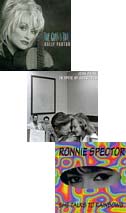|

Comment
on this story
|
|

Three classic artists grow into their voices
by Jesse Fox Mayshark
Dolly Parton
The Grass is Blue (Sugar Hill)
In the liner notes to Dolly Parton's first-ever bluegrass album, producer Steve Buckingham writes, "I think a lot of people had forgotten she can sing like this." Boy howdy. From the galloping cover of Billy Joel's "Travelin' Prayer" that kicks it off, to the a cappella gospel number that closes it, the original Tennessee mountain girl rips and riles and resonates. Over the last 20 years, it's been easy to lose sight of Dolly behind the big chest, big hair, and big teeth. She's a walking punchline, the embodiment of our cultural mammarial obsessions, the redneck cousin of Cher, Barbra, Liza et al. But like Elvis Costello said, there are some things you can't cover up with lipstick and powder. Dolly's wig is still securely in place on the jacket of The Grass is Blue, but there's no artifice inside. All you get is the unvarnished force of her fearsomely lovely voice.
It's easy to be suspicious of anyone jumping on the bluegrass mini-boom these days, but not many people have a clearer title to the music than Dolly. She grew up with it and her high Appalachian quaver is directly descended from the likes of Bill Monroe and Ralph Stanley. Backed by a rollicking band that includes Jerry Douglas and Sam Bush, she nods to those roots with songs by Lester Flatt, Hazel Dickens, and the Louvins. Her half-tempo reading of Johnny Cash's "I Still Miss Someone" is achingly restrained. And her dark-hearted arrangement of the folk ballad "Silver Dagger" is equal parts sorrow and psychodrama. As for the four Dolly originals, they show she still knows her way around a memorable lyric and melody. Bonus points for recording the album on indie folk label Sugar Hill.
Dolly has never shown any particular intent to age (or do anything else) gracefully. And as long as she can sing like this, who cares?
John Prine
In Spite of Ourselves (Oh Boy)
The idea of a John Prine duets album, especially one with only one John Prine song, seems a little, well, off. Prine's flattened voice has a charming scruff to it, but his draw usually works because it matches the grizzled tragicomedy of his lyrics. Here, the folk-country icon puts his limited range up against not only some of country music's classic songwriters (Hank Williams, Felice Bryant, Roger Miller) but also some of its finest female voices, past and present. And, whaddya know, he pulls it off.
That's largely thanks to the loose ambiance of the whole affair—which is an apt word for the collection of cheatin', losin', leavin' songs on In Spite of Ourselves. There are nine guests on the 16 tracks, ranging from kindred mavericks Lucinda Williams and Emmylou Harris to Music Row stalwarts like Patty Loveless and Trisha Yearwood. The two standouts, though, are Nashville vet Melba Montgomery and a surprisingly sassy Iris DeMent. Prine knows it, too, giving Montgomery two tracks and DeMent a satisfying four (the chemistry between Prine's shaggy tenor and DeMent's rich twang makes you wish for an entire album).
The selections run from Hank's "Wedding Bells/Let's Turn Back the Years" to Montgomery's own "We Must Have Been Out of Our Minds." Even the sad songs sound good-natured, and the funny songs—"(We're Not) The Jet Set," "Milwaukee Here I Come"—are downright buoyant. Best of all is the ribald title track, Prine's sole writing contribution. He and DeMent trade lines like "She gets it on like the Easter Bunny" and "I caught him once sniffin' my undies" before promising each other "In spite of ourselves/We'll end up sittin' on a rainbow/Against all odds/Honey, we're the big door prize." If In Spite of Ourselves proves that Prine can sing with just about anyone, it also reaffirms that he sounds best when he's singing John Prine.
Ronnie Spector
She Talks to Rainbows (Kill Rock Stars)
Ronnie Spector always sounded like the big sister of the girl-group crowd. Where Diana Ross was innocence waiting to be betrayed and the Shirelles' Shirley Alston was looking for love in all the wrong places, Spector's vibrato crackled with the wisdom of experience. That's probably the quality Brian Wilson was drawn to when he wrote "Don't Worry Baby" for her. Enmeshed at the time in her minefield marriage to hubby/ genius/paranoiac Phil, Ronnie never got around to that song until now. And as the centerpiece of this minor treasure of an EP—her first recording in ages—it sounds as perfect as Wilson must have imagined it would.
She Talks to Rainbows was produced by punk patriarch Joey Ramone and released on Kill Rock Stars, both of which make sense. As much as the grrl-group label's frontliners Sleater-Kinney "wanna be your Joey Ramone," Joey himself has always wanted to be Ronnie Spector. He re-recorded "Baby I Love You" (with Phil Spector manning the boards) back in 1979, and he managed to sneak a lot of heartbreak ballads into the Ramones' 1-2-3-4 mix. The best of those, "Bye Bye Baby," shows up here as a bittersweet Ronnie-Joey duet. The other Ramone original, the EP's title track, is a negligible bit of rock fluff. But a reworking of Johnny Thunders' "You Can't Put Your Arms Around a Memory" works surprisingly well, and "I Wish I Never Saw the Sunshine" is a fitting capstone for a life and career that have seen plenty of rain. Still, it's "Don't Worry Baby" that will send you to the repeat button. When Ronnie's scarred voice scrabbles up the rising melody line, you almost don't need to hear the words to know they're true: "Well, it's been building up inside of me for oh I don't know how long..." It's the song she's finally old enough to sing.

|